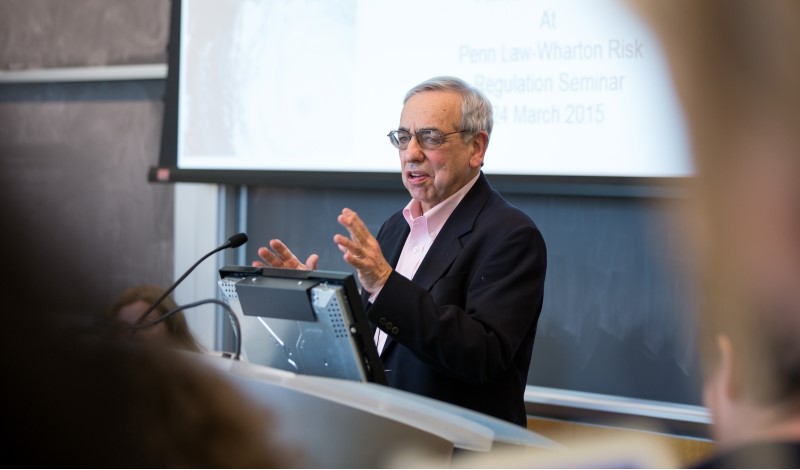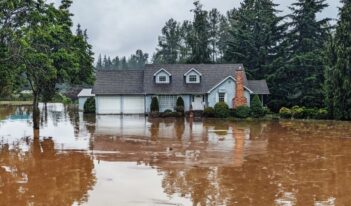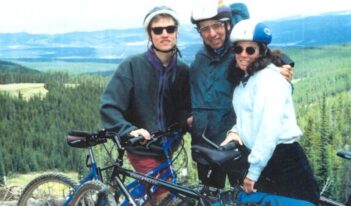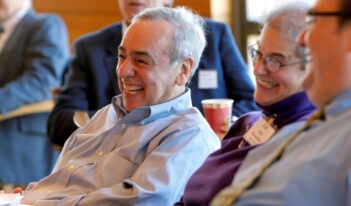
Howard Kunreuther made significant advances in the economics of natural disaster risk management at the same time that he inspired other scholars.
I still vividly remember the first day I met Howard Kunreuther.
At that time, I was working at the VU Amsterdam on my Ph.D. thesis about insurance arrangements for climate change related risks, and I was on a business trip in New York City. I emailed Howard, expressing my interest in meeting him in Philadelphia to discuss my first published paper in Risk Analysis on flood insurance arrangements in the Netherlands. This paper built upon the impressive number of studies that Howard had conducted on natural disaster insurance since the 1970s. I immediately received an enthusiastic response and was excited to sit next to him a few days later in his office at the Wharton School. On his desk was my printed paper covered with yellow notes on which he had written detailed comments. He took the time to discuss my future research plans, and he greatly inspired me as a young scholar.
Howard and I shared common interests in behavioral economics and insurance applications to natural disaster risks, and we started a research collaboration that lasted over a decade. Our joint research took off during my time as visiting scholar at the Wharton Risk Center between 2012 ̶ 2017, and it continued after Howard subsequently appointed me as a senior research fellow until the Center closed in 2022. During my many visits to work with Howard at Wharton, I greatly appreciated his open attitude toward ideas from young researchers, his eagerness to involve them in his projects, and his ability to motivate them to pursue innovative research with policy implications to benefit society. It is impressive that Howard continued to have this open attitude, even when he was in his 80s. I believe that Howard’s exemplary ability to mentor and inspire young researchers throughout his career is a key skill that should be embraced by other academics.
What stands out most to me about Howard’s research legacy are the insights he delivered into the biases associated with individual decision-making about natural disaster risk, which he used to design policies that assist people in being better prepared for future disasters. In this respect, it is remarkable how his early work is still very influential in shaping this literature as of today. Moreover, the policy recommendations that stem from Howard’s early research are also highly relevant for current policy debates over how to limit the accelerating trends in natural disaster losses that are observed around the world.
An example is his book published in 1978, in which Howard showed, on the basis of surveys of more than 2,000 households across the United States, that individuals are more likely to prepare for disasters (such as by purchasing flood insurance) if their neighbors, friends, and family members do the same. Moreover, he found that people were more likely to engage in actions to limit impacts from a future natural disaster after they experienced a disaster in the past. To the best of my knowledge, this research by Howard provided the first empirical evidence in the natural disaster risk context for the availability heuristic as well as for the herding bias. The availability heuristic implies that individuals have higher risk perceptions after experiencing a natural disaster, and the herding bias reflects that individuals imitate natural disaster protection behavior of others. These observations by Howard have informed many subsequent studies by others, and his results have been replicated in an expanding literature that analyzes individual risk reduction actions in diverse natural disaster contexts using surveys and experiments.
Howard’s own contributions to the literature on decision-making with respect to low-probability/high-consequence risk expanded substantially after his 1978 study. He clearly enjoyed it when I told him his name came up most frequently in a 2019 systematic review of experimental and survey studies on demand for insurance against this risk. Many of his important contributions showed substantial deviations from the rational economic choice model, for instance, due to individuals’ underweighting of low-probability risk and the role of emotions in decision-making.
The ways that people in disaster-prone areas deviated from rational behavior that Howard observed in his research motivated the policy recommendations he analyzed to improve natural disaster risk management. In this respect, his 2018 article on improving the National Flood Insurance Program presented the following two important guiding principles for insurance:
Principle 1: Premiums should reflect risk. Under this principle, insurance premiums charged to policyholders should be differentiated according to the risk they encounter to give adequate incentives to policyholders for taking risk reduction measures. This recommendation relates to Howard’s earlier research highlighting the need to reward policyholders for the risk reduction measures they take with discounts on their insurance premium. In this way, insurance can correct for the way that many individuals underestimate the risk they face and fail to adopt cost-effective risk reduction strategies, such as flood-proofing and elevating homes in flood-prone areas.
Principle 2: Fairness and affordability issues must be addressed. This principle recognizes that low-income households who live from paycheck to paycheck need financial support to enable investments in risk reduction measures. But this support should come from general public budgets and not premium cross-subsidization. Additional policy recommendations that were central in Howard’s research focus on behavioral nudges, such as activating social norms of protection through offering seals of approval to work with the herding bias.
I expect that the academic legacy of Howard Kunreuther will have a very long-lasting influence on various disciplinary fields of research focusing on decision-making under low-probability/high-consequence events and natural disaster risk management, including insurance. I hope that many younger scholars will be positively influenced by his research and seek to contribute to these research fields, just like I have been inspired since the day I first met Howard. Given the increasing trends of natural disaster losses, and the expectation that climate change will accelerate these trends worldwide, the insights Howard delivered for disaster risk management policies will only grow in importance in the future.
This essay is part of a series celebrating the life and scholarship of Howard Kunreuther, titled “Commemorating Howard Kunreuther.”




